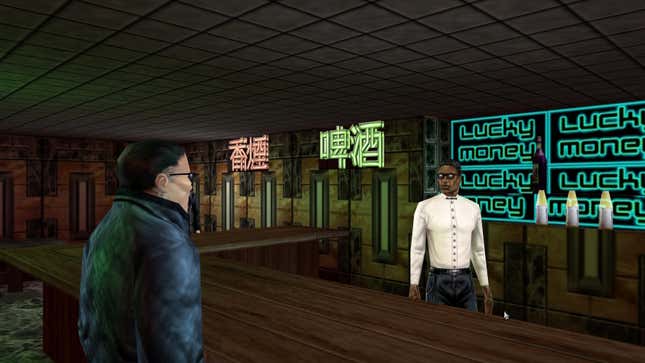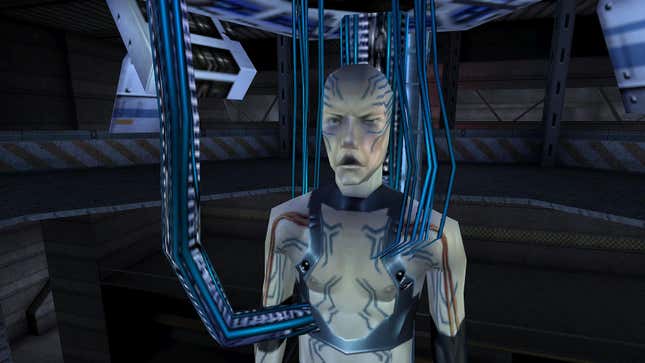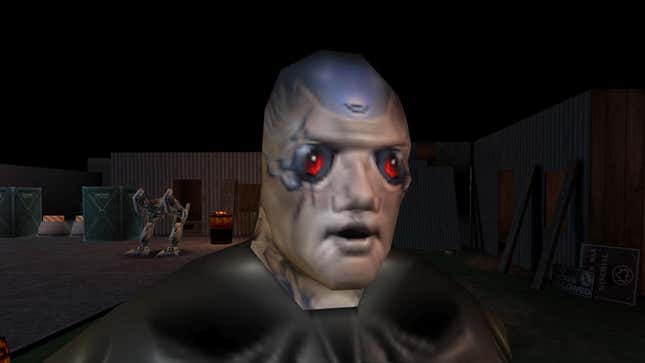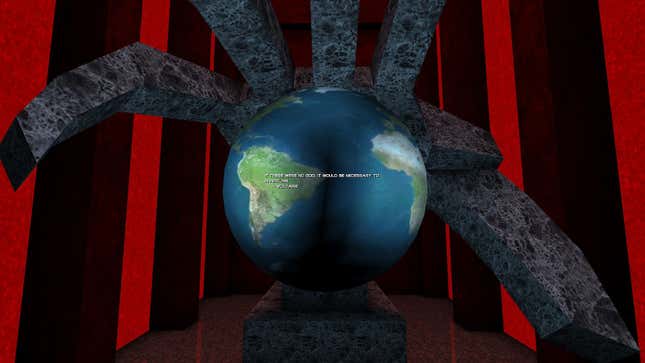
Yesterday, June 23, marked the 25th anniversary of what can convincingly be described as one of the best games of all time. Deus Ex, created by the distinct Austin branch of John Romero’s controversial studio Ion Storm, was a first-person RPG that would change how an entire generation of players and developers thought about video games. It was a game that was built from depths: depths of skill, knowledge, intelligence and narrative. It remains exactly as brilliant today as it was a quarter of a century ago.
In fact, it works better today than it did ten years back. Picking up a copy of the game on GOG today, I was able to launch it (only switching the rendering to OpenGL) and have it run out of the digital box. A decade ago, doing this required installing a handful of different mods, and there was no way to actually play it in its vanilla version. And right away, I was pulled back in, crazy clip-cloppy footstep sound effects and everything. I feel ready to yet again dive back into this world of overlapping conspiracies, deep philosophy, and juggled morality.

So what makes Deus Ex so special? I feel like I could spend a dozen articles answering that question. In fact, ten years back, I wrote six in a row when revisiting the game. It’s a combination of so many factors coming together so superbly, with a dream team of developers, financial backing, an exquisitely good story, and a complete lack of expectation from its future audience.
In 1996, when the economy was booming in preparation for the colossal bursting of the dot-com bubble, John Romero and Tom Hall, flush with success from id Software and its massive gaming series Doom and Quake, set out to create a new Texan developer: Ion Storm. Together, they spent lavishly, fought explosively, and created two compellingly dreadful games. First was Dominion: Storm Over Gift 3, and then the infamously disastrous FPS Daikatana. However, alongside all this, former Looking Glass (Thief, System Shock) developer Warren Spector had been asked to create a parallel studio, Ion Storm Austin.
Distinct from Romero’s Dallas studio, Spector had creative freedom and a pool of money, and quickly hired talent he knew from his days at Looking Glass, including Harvey Smith (Dishonored). In just 28 months, a tiny team of 20 pulled together (albeit with production troubles, serious frustrations, and “knock-down drag-out fights”) one of the most immersive, intricate games the world has ever known.

In the original Deus Ex, before its unfairly maligned Xbox-led sequel and its goth-eyed post-2010 prequels, you play as JC Denton, a cybernetically augmented human who works for a government agency called UNATCO. He discovers his brother Paul is working for a terrorist organization, the NSF, all amidst a global pandemic called the Grey Death. Very quickly, your assumptions about good and bad, right and wrong, are questioned, and you’re drawn into an intricate web of conspiracies and conflicting alliances.
This plays out...kinda how you want it to! There’s obviously a core, unavoidable plot, but how you approach it will dramatically affect the story you allow yourself to be told. It can be an ultra-violent FPS, where you blast through enemies with rockets and explosives, or a super-spy sim as you assassinate opponents, or you can be an unseen stealth pacifist, determined to kill no one, relying entirely on tranquilizers and stun guns. Every mission can be approached in multiple fashions, from spectacularly smashing through the roof of a building for an all-out gun fight, to slipping in through the vents such that no one ever knew you were there.

I’ve told this anecdote too many times before, so apologies, but it captures the essence of what makes Deus Ex quite so extraordinary: At the time of its 2000 release, I was writing for the UK version of PC Gamer, where the reviews editor was one Kieron Gillen (now best known for his comics work, but once my colleague at RPS). Gillen had played the game for his world-class review (I’d link to it, but Future Publishing treats people’s efforts to archive its magazines with hostility—instead I’m copying out of my physical edition), which contained the words:
Games—like most other forms of entertainment—have a terrible habit of making you less than you are normally, simplifying you into a stripped-down cartoon...Deus Ex is one of the few games that succeeds in making you more than you are. Because Deus Ex’s universe is, obviously, reduced, you feel as if you have more freedom than you do in reality, which, like Fight Club for example, reminds you of your own freedom in reality. It’s a slap in the face, it reminds us how good videoart can be. And this is art. It’s beautiful. And I’m going to stop now before I start to cry...
I was playing it soon after, and occasionally calling Kieron to chat about what was happening. On one call I said to him, “I couldn’t believe it when my brother died.”
“My brother didn’t die!” Kieron responded in bemusement. And then we both had a moment in silence, realizing that this game was offering even more than we’d already thought.
Deus Ex was a game in which the finest details rung with intelligence, in which every book you found contained provocative ideas or conflicting philosophies, in which characters responded to you in subtly different ways depending upon how you were playing the game; on this micro level it felt malleable and responsive to you and how you reacted to it. But to discover that it was also offering the same flexibility to massive story beats was just mindblowing.

The game’s influence on the industry is impossible to overstate. While the circumstances and relative creative freedom afforded to its development are extremely hard to come by twenty-five years on, you can see the game’s DNA in so many of the games we love today. Even beyond the more obvious, all the immersive sims born in its shadow (BioShock, Dishonored, Prey...), so many developers cite Deus Ex as a major source. Cyberpunk 2077's quest director Mateusz Tomaskiewicz named Deus Ex when asked for his main inspirations. Speaking to GamesRadar he said,
This one had a great impact on me as a developer and player back when I played it for the first time many years ago. And what I really liked about that game was completing the missions in many ways. It was not only based on dialogue decisions, since you also had the things that were on the map and its different points of entry that allowed you to get into buildings, as well as elements that opened different paths in history.
But most importantly, it’s still a hell of a game to play today. Sure, its art is a bit crummy—it was criticized for this when it was released! God, those wall textures. But it matters so very, very little once you’re deep in its story, learning what it has to teach, reacting against what you find abhorrent, embracing what draws you in. (I’ll never forget my moment of pure horror when, working as a youth worker as I also was during the game’s release, one of the teenagers told me how furious he was about being forced to leave UNATCO, as to him they were clearly the good guys. Uh-oh.)
It’s currently just $3.49 on GOG (although it often comes down to a lot less than that on both GOG and Steam), and if you’ve never played it, then prepare to have your life properly, actually changed.
Happy birthday, Deus Ex! Thanks for changing my life too.
Correction: 06/24/2025, 17:14 p.m. ET: The article has been updated to correct Warren Spector’s last name, which I got wrong twice, which is so rude, so apologies for that.
.